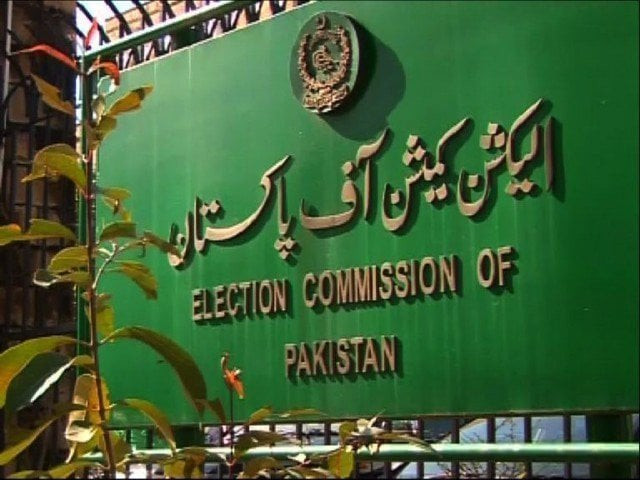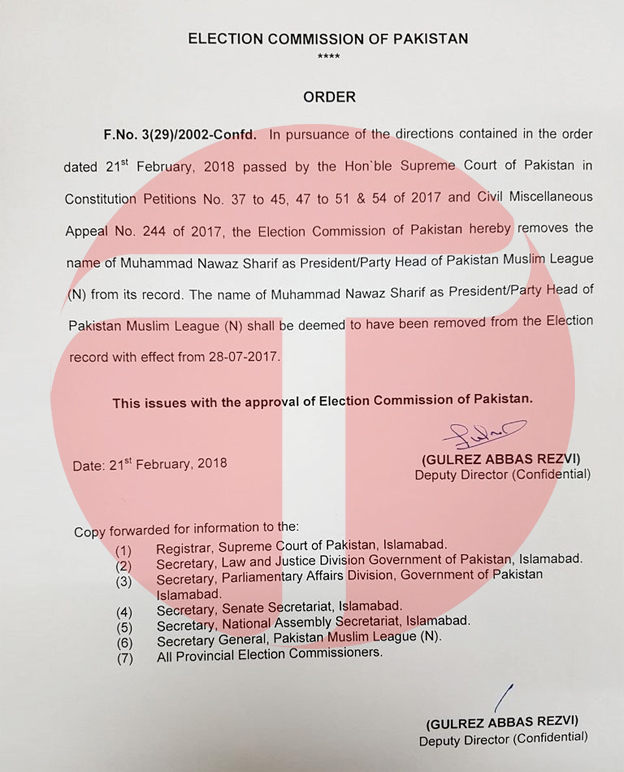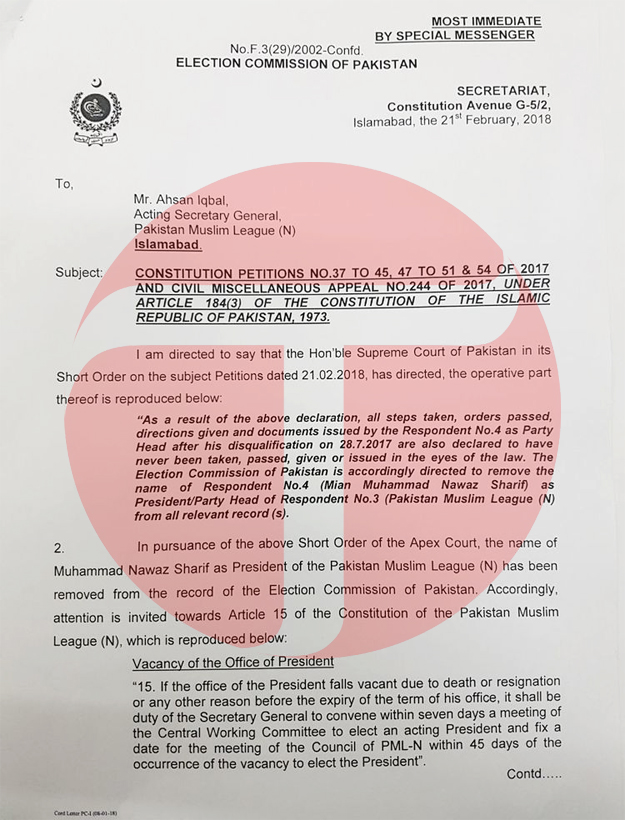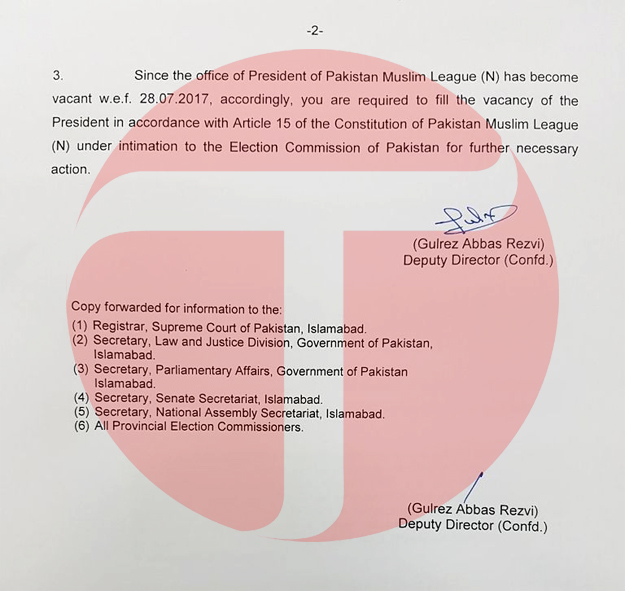ECP removes Nawaz Sharif’s name as PML-N president
Poll supervisory authority is set to decide fate of the ruling party’s candidates for Senate elections on Thursday

ECP to decide the fate of PML-N's Senate candidates on Thursday. PHOTO: FILE
Soon after the Supreme Court decision on Wednesday, the Election Commission of Pakistan (ECP) removed the former prime minister’s name as PML-N president. An ECP notification says his name would be deemed to have been removed from the ECP record with effect from July 28, 2017.
The ECP also wrote a letter to Ahsan Iqbal, the PML-N acting secretary general, asking him to call a meeting of the party’s Central Working Committee within seven days and fix a date for a meeting of the Council of PML-N within 45 days to elect a new president or head of the party.
Supreme Court bars disqualified Nawaz Sharif from heading PML-N
However, like the short order of the apex court, the ECP also kept mum on the status of the Senate candidates who were issued PML-N tickets by Sharif for the March 3 elections. Same is the case with lawmakers who were elected to the national and provincial assemblies on PML-N tickets signed by Sharif after his re-election as party president in October last year.
After his disqualification as member National Assembly, and resultantly as prime minister, on July 28 last year, Sharif had to quit his party office as well. As a stop-gap arrangement, the PML-N elected Sardar Yaqoob Nasir as acting president.
But as soon as parliament passed the Elections Act, 2017, it removed the condition of Articles 62 and 63 for office-bears of a political party, and Sharif was re-elected as PML-N president.
Under the Political Parties Order of 2002, an office-bearer of a political party was required to meet the same criteria set under Articles 62 and 63 of the Constitution to become parliament member.
In its Wednesday’s short order, the Supreme Court declared that provisions of sections 203 and 232 of the Elections Act, 2017 are “liable to be read, construed and interpreted subject to the provisions of Articles 62, 63 and 63-A of the Constitution”.
Forgone conclusion: Sharif elected PML-N president ‘unopposed’
Section 203 of the Elections Act, 2017 reads: “Membership of political parties. – (1) Every citizen, not being in the service of Pakistan, shall have the right to form or be a member of a political party or be otherwise associated with a political party or take part in political activities or be elected as an office-bearer of a political party.”
After the top court’s decision on Wednesday, it has become mandatory for lawmakers to meet conditions under Article 62 and 63. This practically applies a relevant clause of the Political Parties Order of 2002 to political party office-bearers, including party head, once again.
The same rule applies to PTI’s former secretary general Jahangir Khan Tareen. He was disqualified last year as MNA on almost same grounds as Sharif and had to quit party office.
PTI chief Imran Khan had kept the office of party’s secretary general vacant in the hope that Tareen might be re-elected to the coveted office in case the petitions against Sharif’s party presidency are rejected by the top court.
The Supreme Court’s short order further reads, “As a consequence, it is declared that any person who suffers from lack of qualification under Article 62 or disqualification under Article 63 of the Constitution is debarred from holding the position of ‘Party head’ by whatever name called and prohibited from exercising any of the powers provided in the Article 63-A of the Constitution, as ‘Party Head’ or any other prohibition shall commence from the date of disqualification and continue till such time that the lack of qualification /disqualification of such person continues in terms of provisions of Articles 62 and 63 of the Constitution.”
In its last paragraph, the SC order says, “All steps taken, orders passed, directions given and documents issued by the Nawaz Sharif as Party Head after his disqualification on July 28, 2017 are declared to have never been taken, passed, given or issued in the eyes of the law.”
This order puts into question all documents Sharif signed as party head during the past few months, including the party tickets he issued to election candidates, also including the recently elected MNA from Lodhran.
Interestingly, the PML-N does not have a permanent party secretary general, and Ahsan Iqbal is acting in that capacity. Party’s constitution gives unbridled powers to party president which is not the case with many other parties. For example in Zardari’s PPP-P, secretary general of the party is empowered to sign party tickets.
The Supreme Court order has practically struck down the law parliament passed last year, removing conditions of Articles 62 and 63 for office-bearers of a political party. This is likely to trigger yet another debate about powers of parliament versus powers of judiciary.
Immediate challenge is the fate of Senate candidates. As per the Constitution, Senate elections should be held before March 11 – the day the term of 52 senators expires. The new senators have to take oath on March 12.
According to ECP officials, the chief election commissioner (CEC) and four members have to take a decision on this important issue. However, this is first time that such a situation has arisen. While the law is silent on the matter, the SC’s short order has not mentioned anything about it.
One option before the ECP is to approach the SC to clarify the confusion. Some lawyers say the ECP can treat PML-N candidates as independents and it is also empowered to issue a new schedule.
The Senate elections schedule spans one month, which is not possible now given that they should be held before March 11.
The ECP is likely to meet in a day or two to deliberate on the situation.






















COMMENTS
Comments are moderated and generally will be posted if they are on-topic and not abusive.
For more information, please see our Comments FAQ